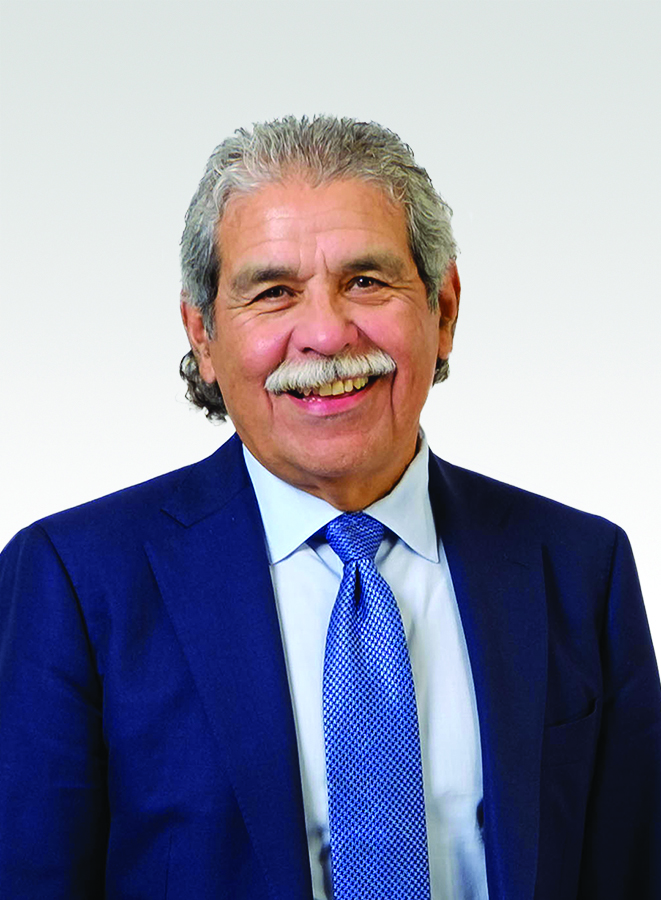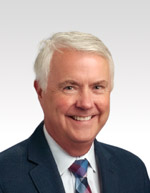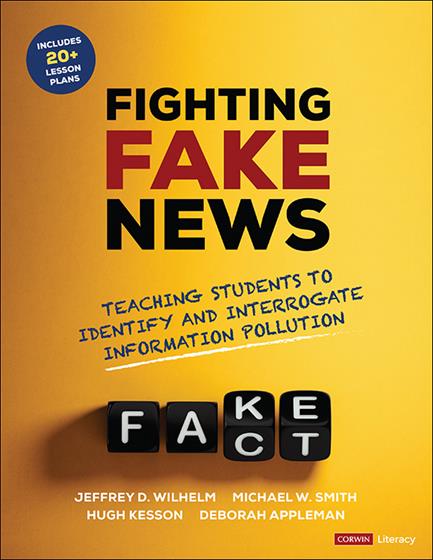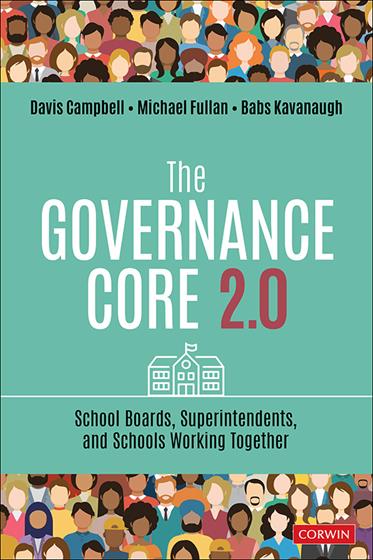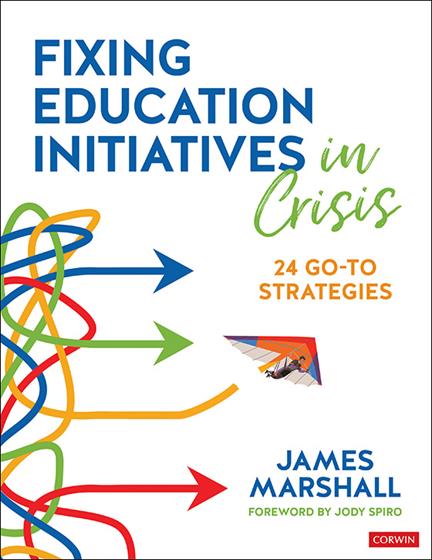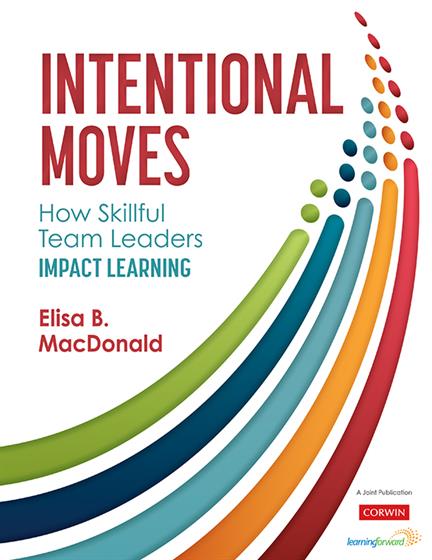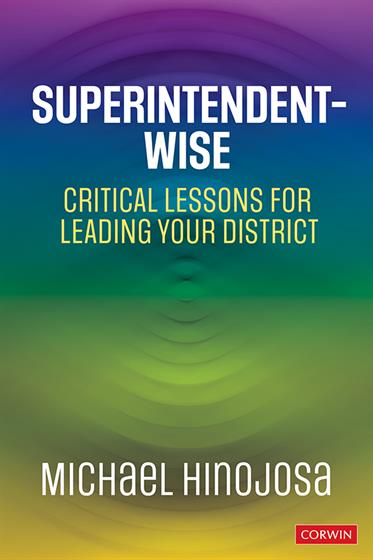[00:00:00.60] ANNOUNCER: Welcome to Corwin's Leaders Coaching Leaders
podcast with hosts Peter Dewitt and Michael Nelson. This podcast is from
education leaders for education leaders. Every week, Peter, Mike, and our
guests get together to share ideas, put research into practice, and ensure that
every student is learning not by chance, but by design.
[00:00:26.14] PETER DEWITT: Michael Nelson. Here we go with another
interview for Leaders Coaching Leaders.
[00:00:30.32] MIKE NELSON: You know what, this is an early get up on the
West Coast for me, Peter. And I'm telling you, this interview was well worth
it.
[00:00:37.45] PETER DEWITT: Yes. And I am a little bit under the weather. I
like to say allergies. You like to say it sounds like you're catching a cold.
But it was worth all of it just to have the interview. I know the season's
focused on leading with intention. And we didn't necessarily ask our guest a
question about leading with intention. But he gave us so many intentional ways
to lead that it was outstanding.
[00:01:03.32] So our guest is Michael Hinojosa. And he was the
superintendent of Spring ISD in Spring, Texas. He's been in Dallas. He was in
Austin. He has been a superintendent in some of the biggest school districts in
the country. And he's been a superintendent for 27 years.
[00:01:22.01] And he has a new book coming out with Corwin called
Superintendent Wise-- Critical Lessons for Leading Your District is the working
title right now. And he was just outstanding to talk to. What were your
thoughts on what people should be paying attention to when they listen to this
interview?
[00:01:41.19] MIKE NELSON: Peter, I work with a lot of superintendents and
have, in particular the last four years in my work in Washington State. And the
way he calmly and succinctly describes how to lead the superintendency with
intention. Because I think he nailed it. And we didn't necessarily use that
word, but he truly nailed it with the students in the center and your community
and staff and your school board as the four tips points of that triangle.
[00:02:09.61] He just nailed that answer. And how he described that, from my
perspective, having been a superintendent in the same town that I was raised,
just like him, just a beautiful job.
[00:02:21.66] PETER DEWITT: There were so many similarities to some of the
questions he was answering to what I've heard you talk about as a
superintendent. And so I think whether you are a superintendent, or you want to
be a superintendent, or you're building leader or a teacher leader, it doesn't
matter, I think some of the things that he talks about are important for any
level that you might be at when it comes to education.
[00:02:48.19] MIKE NELSON: That's mind blowing-- I can't believe you just
said that because that's exactly what I was just thinking. Because I want to go
to Corwin and say, no, you need to put the slash through
"superintendent" and say "school leader," School Leader
Wise-- Critical Lessons for Leading.
[00:03:03.97] PETER DEWITT: So anybody from Corwin listening, that's Michael
Nelson, who actually is telling them how to title the book.
[00:03:11.41] MIKE NELSON: Well, to your end-- you're just making fun of me
just now, but I think the lessons, the things that he said, I wish I would have
known when I was a principal too.
[00:03:21.44] PETER DEWITT: Yeah. Well, if I get to bust on you a little bit
during the podcast, I mean, that makes me happy too. But one of the things--
[00:03:29.53] MIKE NELSON: I hope to be back for the next podcast now. But
yes, that's true.
[00:03:34.39] PETER DEWITT: Apparently, I inspired you to say that, so we're
both guilty. I think one of the things that I also liked about what he said was
he loved every job that he had. But they all didn't start out well either. It
was up to him to change it. And I just thought that was a really powerful
message.
[00:03:53.30] So Michael Hinojosa. And it is an outstanding conversation. So
we hope that you enjoy.
[00:04:01.78] MIKE NELSON: Absolutely. Enjoy it for sure.
[00:04:03.71] [AUDIO LOGO]
[00:04:06.55] ANNOUNCER: Picture yourself popularly known among staff
members as the reliable go to person who makes meaningful change happen. This
is possible when you equip yourself with robust strategies and tools from
Corwin's leadership workshops. Sign up today at corwin.com.
[00:04:21.98] PETER DEWITT: Michael Hinojosa, welcome to the Leaders
Coaching Leaders podcast.
[00:04:26.60] MICHAEL HINOJOSA: Thank you very much. I'm excited to be here.
[00:04:29.21] PETER DEWITT: OK, I have a question before Mike Nelson steals
all the good questions based on the fact that you're both former
superintendents.
[00:04:37.24] MIKE NELSON: I am so ready for this interview.
[00:04:40.22] PETER DEWITT: How many-- so you've been a superintendent in
large districts for 27 years. How does one actually maintain a superintendency
for 27 years? Because you don't hear that very often.
[00:04:55.36] MICHAEL HINOJOSA: Well, yeah, it's quite unusual. I was very
fortunate that-- there's two paths to the big superintendency. One is you start
at a smaller district, learn how to be a superintendent. You learn how to go to
communities and learn how to make it work. The other is to start as a deputy in
a large system and then try to take over.
[00:05:16.34] And neither path are right or wrong. But the fact that I had
the opportunity to learn and fail a couple of times really prepared me for the
long haul. And I can point to one-- the epiphany I had is when I went to
Suburban Houston, Spring ISD, I met with a former superintendent named Gordon
Anderson, and he taught me the secret sauce of the success triangle.
[00:05:41.90] And he said, the students are in the middle of this triangle.
At the top is the school board. In one corner is the staff and the other corner
is the community. So if you work all three and spend time with all three and
develop deep relationship with all three, then you can thrive. If you only have
two of the three, all can do is survive. And if you only have one of the three,
you better get a new job because this one's over.
[00:06:04.58] So I took that as I learned that. And then I implemented that.
In fact, my calendar was color-coded about how much time I spent in each part
of that triangle.
[00:06:18.79] MIKE NELSON: I think that's brilliant. I really think that's
brilliant. So, Michael, I'm a former superintendent in Washington State. And
when I looked at your bio and read a little bit more about you, there's a lot
of similarities that we have, one of which is being superintendent in the town
in which we went to school and were a part of, and the significance of that
alone.
[00:06:42.29] So, just a lot of similarities. But what you describe is a
three-legged stool. And we all, the three of us on the screen and all of our
listeners right now, that a stool cannot stand up without all three of those
legs. And so your poignant, yet simplistic vision of how to lead a system is
truly, truly remarkable. And that's a takeaway right there, Peter, for sure.
[00:07:07.70] I would love to just engage in a little bit of-- when I read
your story and a little bit about who you are and your resilience and your-- I
loved when, in your bio, talked about somebody introduced you and they said,
I'm unapologetic. And I loved that piece. And so will you share a little bit
about your background? Who made a significant difference to have you in a place
of where you are, sharing your brilliance on a worldwide market?
[00:07:42.07] MICHAEL HINOJOSA: Well, yeah, I was very fortunate. Very
humble beginnings. My parents-- I'm an immigrant. I was number 8 in a family of
10. The last one born in Mexico. And my parents had a formal fifth grade
education. But they wanted to bring us to the greatest country in the world so
we could get an education.
[00:07:58.10] And so 8 of us graduated from high school. And this real story
legacy of my parents out of the-- they had 22 grandchildren. Out of the 22
grandchildren, 2 are special needs, just like America, 10%. The other 20 went
to college. Those 2 didn't get to go to college. The other 20 went to college
and 16 graduated, including my 2 sons from went to Harvard and Princeton. So
that's why I do what I do and did what I did for so long, because public
education is the great equalizer.
[00:08:29.24] I will also tell you that I'm not proud of my SAT score. In
fact, I applied to very few schools, but I'm proud of the 4.0 I got from the
University of Texas when I got my doctorate because Carol Dweck's work is,
effort creates ability, and you get smarter through hard work. So I've tried to
model that.
[00:08:48.92] Some of the guys that I grew up with in the hood were a lot
smarter than me, but they didn't-- this version of school did not work for
them. And I was fortunate. I liked school. I wasn't very good at it, but I
liked it so I never missed a day. So I just kept picking up knowledge, skills,
and always had a good attitude. And that's really kind of what propelled me
through my teaching career and then my professional career.
[00:09:13.71] I will tell you, there are two things I say facetiously that
helped me be a superintendent for 27 years. Number one is I was a government
teacher, so I understood politics. I wasn't a politician, not yet anyway. But
then the second thing is that I was a basketball referee for seven years.
Everybody's always yelling at you. And if people yell at you and you lose your
mojo, you're not going to be very effective.
[00:09:38.10] And so you learn how to develop a thick skin. You learn how to
go to the greater good. And as that's what kept me in the game, is having that
resilience that you talked about, the muscles that were built in me over many
different experiences. And so I also like to say this-- every job I ever had is
the best job I ever had, and none of them started that way. So you just got to
find a way to work through the challenges when you take on a new task.
[00:10:10.27] PETER DEWITT: OK, Michael. I have to tell you, I had a whole
set of new questions for you, but I just thought about some new ones based on
what you just said. So you and I have some similarities. I'm the youngest of
five. My dad died when I was in fifth grade and my mom went back to get her GED
when I was in sixth grade. And I am not proud of my SAT scores either. I was
actually academically ineligible to run cross country in college because of the
fact that my SAT scores were so low.
[00:10:38.41] And I too am proud of the fact that when I got to my third
community college, I went from a 1.7 GPA to a 3.86. And now I have two master's
and a doctorate. So you're very much speaking my language and Carol Dweck and
growth mindset and all of that.
[00:10:54.79] I think my new question is, what changed for you? What helped
you go-- because I think that's part of the real story. Two out of three of us
on the screen were deemed as unsuccessful in school for a variety of reasons.
And yet, all three of us found success. But two of us found success a little
bit later on. What changed for you?
[00:11:22.26] MICHAEL HINOJOSA: Well, I don't know. We have a great family
and we've done some family history and we've done-- family histories. And part
of it is that I had just developed a great resilience and grit. And part of it
is my attitude. I think there's no problem that I can't solve, whether it's a
personal problem like getting a young lady pregnant when I was in college and
being a 21-year-old dad. That marriage didn't work out, but I have a great
relationship with that son.
[00:11:50.02] Whether it's personal, whether it's professional, where we
only had 9% of our students with any kind of post-secondary credential six
years after high school in Dallas during my first term. And then my second
term, we have 10% of our kids graduating from high school with an associate's
degree for free, making $60,000 a year. So you just got to find the right
problem.
[00:12:13.90] And I think that people who are hungry, humble, and smart can
resolve almost any problem. And if they have the right attitude. Because you
got to have that optimism and you got to believe in the art of the possible.
And I think that was always in me, that no matter what happened to me
personally or professionally, I was going to be able to overcome it.
[00:12:36.56] And so I've always had a lot of great mentors and people that
pushed me out there. In fact, I discovered that I had the imposter syndrome
until we did that video history of my family and me. And so, I mean, when
you're so hard on yourself-- my dad never punished me. He was tough on my
brothers and sisters. But he knew I was going to be tougher on myself than
anybody was. And I think knowing that that was already inside of me, I think
that just propelled me.
[00:13:06.37] Yeah, my SAT score was terrible. I had to take the GRE three
times to get into the University of Texas. But I got my degree, and I did it
quickly. I did it within three years. And so writing this book for Corwin, it
was a slow start. And I wanted to do it from the personal perspective. But they
convinced me that I had a lot to offer to people who wanted to be in the chair.
And once I got going, then it didn't take me long to actually write the
manuscript. So it's just kind of part of my DNA.
[00:13:38.86] PETER DEWITT: To me, I think you've got two simultaneous
stories going on, because of the fact that I think people need to hear that you
struggled a bit when you were younger and where you are today, because I think
that it helps people see their students who are struggling through a different
lens.
[00:13:57.22] And Mike Nelson is right. I actually read the same comment
about the fact that you are unapologetically honest. And you're certainly
showing that on this podcast for sure. So I appreciate that.
[00:14:12.39] MIKE NELSON: I think, yeah, and I just think the struggle-- we
all continue to have struggles. I'm sure you had a ton of struggles during your
superintendency and you continue to as well, and learning how to overcome that
or push through and open your mind to what are the possibilities, where's the
hope within this struggle. You describe that beautifully.
[00:14:32.41] But let's go ahead and pivot a bit because we want to know a
little bit more about this book that you put out. And so what I have as the
name, Superintendent Wise-- Critical Lessons for Leading Your District, both
strategies and stories are embedded within the book. Tell us about a little bit
how the book is framed and what you hope for this book.
[00:14:53.94] MICHAEL HINOJOSA: Well, my hope is to help people learn how to
do the job so they can excel, so they can go for transformation. Nobody wants
to go to reform school. Nobody wants reform. We want transformation. Because,
for two of us, it just took grit for us to get through it.
[00:15:12.11] And so what I did is, I started an academy for the Council of
the Great City schools, and it's to develop future leaders. And as I put the
curriculum together, I had the epiphany that maybe my books would follow the
same pattern. So chapter one is, focus on board relations. Because if you can't
get along with the board, it doesn't matter. You're not going to be successful.
[00:15:35.05] Chapter two was-- it took me a little while to realize that
people are scared of politics. And so media and politics is chapter two.
Chapter three is talent management and labor relations. Chapter four is-- I had
the epiphany that I use the commutative to drive performance, so it's community
relations and performance management. I don't even get to academics 'til
chapter five, because if you don't do the first four, you're not going to be a
teaching and learning leader.
[00:16:06.79] And then chapter six is operations. Dallas has 20,000
employees, a $2 billion annual budget. You better know something about
operations because it'll sink you in a hurry if you don't. And then my last
chapter is ethics and equity. And so the reason I put it last is that I've seen
a lot of people fail because of ethical issues.
[00:16:32.12] But also, you cannot be an equity warrior unless you deliver.
So if you just want to talk about equity, some people want to be superintendent
but they don't want to do superintendent. Some people believe in equity, but
they don't want to do it. And they get scared when people say, boo.
[00:16:47.47] So she was right. I'm unapologetic. But I can't talk about it
until I deliver for students and I have evidence that I've delivered. And so
that's why how I frame it, is that you got to build street cred, you got to
build relationships, you got to have the board, the staff, and the community to
believe in you before you can start talking.
[00:17:07.31] And never-- you can't shame people into doing the right thing.
It's got to be for the right reason. And so that's how I've laid out my book.
And I've put anecdotes, and stories, and evidence, and data. And it was a lot
of fun writing the book. So I'm looking forward for it to get out.
[00:17:26.65] PETER DEWITT: I was going to say, one of the things that you
and Mike Nelson have in common is the same philosophy about your board and your
community. I mean, I've spent a lot of time in the community where he was a
superintendent. So the same is definitely true for what he's doing. One of the
things that we've been confronted with a lot are questions around the board and
what people are deeming polarizing conversations. And you even said you're a
former government teacher.
[00:17:53.54] So I'm actually really interested in understanding how do you
help superintendents building leaders navigate-- it's not a new space to have
polarizing conversations, but it seems a lot more-- for some reason, seems like
it's a lot more in the news and it's a lot more sensitive. And you've got
teachers and leaders that are not willing to actually engage in those
conversations because they're worried about their jobs.
[00:18:25.24] So, for somebody who is so seasoned and has such great
background, you've got a government background as well, and you said you're not
a politician yet, I did notice that you said "yet," how do you help
leaders navigate this space where there are often polarizing conversations?
[00:18:44.24] MICHAEL HINOJOSA: Yeah. And it's really a manufactured crisis.
And these polarization political fights used to only happen in urban districts.
But now, in suburban communities, even rural communities, they're going through
it. And as I was writing my book, everybody hates the word
"politics." And everybody hates the concept of politics. But there's
politics among soccer moms. So once you understand how this stuff works.
[00:19:12.96] And so I actually googled the word politics. And Wikipedia
said that the root word of politics is "power." Well, people don't
like people to talk about power either, unless you say, oh, she's a very
powerful person. And that's not so bad, but it's still not good. Well, then I
googled the word "power." And the word that came out was
"influence." Nobody has a bad connotation of influence. How do you
influence things?
[00:19:41.16] So if you really just think about influence and knowing that,
in a volatile situation, somebody in that room has-- you need a power map. What
are the relationships that impact this stuff? So once you break it down like
that, if I can just get to the right influencer, then I can figure out how to
have a calm, professional conversation about what's best for students without
getting into-- and the reason this is so volatile now is somebody figured out
that nobody votes in school board elections.
[00:20:13.58] And that's the best way to become an elected official. And
then you go to city council. And then you go to the county. And then you go to
the state. And you become a real-- not a statesman, but a politician. So if you
understand that narrative, then you can be counterproductive and
counterintuitive on how then you break that apart.
[00:20:39.70] And then you do it in the best interests of your own school
district, your own school, your own soccer team, to make sure that things are--
everybody has some voice in the situation. But yes, the volatility is off the
charts. In fact, I work with the Council of the Great City schools. And out of
the 79 school districts, only 5 superintendents had previous council
experience.
[00:21:06.38] I'm talking about New York, Seattle, Los Angeles, Charlotte,
whoever you want to talk about. And 2 of those were about to be fired, and only
another 12 or 13 had previous superintendent experience. And the superintendent
in San Francisco came from Hayward, very small district. The superintendent in
Little Rock came from a takeover district in Mississippi.
[00:21:30.50] And the other 65-- this is the first time they're a
superintendent. And so they're having to learn all of this. And with the
volatility that's out there, and even in big county districts, especially in
Florida, the governor has a lot of influence on who's on the school board. And
we're just trying to start off, as teachers, trying to help people. And then
now we have to learn all of these dynamics for the greater good.
[00:21:56.97] And if you can figure out how to keep things calm, then your
principals can deliver on the academic trajectory that you want your school
district to go on.
[00:22:08.90] MIKE NELSON: I have a story, Michael, that I'm sure you
received, too, many times when I was superintendent, that, well, you're not a
politician. You're a superintendent. And I just chuckled and smiled and thought
to myself, yeah, your definition of politician is very true.
[00:22:27.45] And it's like who's the one meeting and connecting all the
mayors, and the Chamber of Commerce, and the service clubs, the rotaries, and
the Lions and everybody in the community? And I can't wait to read your book
because I'm sure it connects all of those pieces around what your center of
that triangle is, around that student piece.
[00:22:50.39] MICHAEL HINOJOSA: Yeah. In fact, very few people think about
that. But yes, county executives, and if you have multiple mayors, you can
never-- I mean, yeah, I write about the Rotary Club. All of that stuff--
everything you just mentioned is in the book, it's written down, so that people
can consciously think about how to put that together.
[00:23:12.20] MIKE NELSON: You had a couple stints in Dallas. Different
experiences, correct? You were in Dallas and then you went away and then you
came back to Dallas. That's a leadership, strategic move on your part. Can you
share a little bit about your thinking as a leader and timing of shifting and
coming back, and how your skillset matched at that time at the right time?
[00:23:40.95] Because I think that's another key piece for leaders to
understand, of your skillset, the timing, the people, and elected officials all
need to match up if you're going to hit that target of the students in the
center all at the same time.
[00:23:54.62] MICHAEL HINOJOSA: Yeah. And it's a little bit even more
profound since I was a student in Dallas. I was a student in Dallas. I was a
teacher in Dallas. I couldn't even get an interview for an assistant principal
in Dallas. So I had to leave and go away and learn how to become a
superintendent. Finally, I get an interview for Dallas.
[00:24:08.88] But let me also tell you that in the 1990s, Dallas had five
superintendents in five years and one went to federal prison. It was one of the
worst districts in the country. Then, right before I came-- and then I made it
very public that I wanted to be the superintendent of Dallas.
[00:24:24.94] But I got recruited when I was in suburban Austin. But I said,
I'm not ready yet. I need to learn how to run a bigger system before I come
home. Because my father was a preacher and he was here, and my family. And so I
said, no, I'm not ready yet. So then-- because then they hired the former
commissioner of education from Texas, that he made the job doable. It was
undoable before he did it.
[00:24:48.26] Now, when I came in, people wanted us to be successful, but
they didn't believe in us. And during my first term, I did a lot of blocking
and tackling, put in a curriculum, put in high expectations, cleaned out a lot
of the corruption. And so then people asked me why I left. Well, I lost my best
board member and he got replaced by someone else.
[00:25:08.34] And then my boys were going off to the Ivy Leagues. And so I
said, I figure I can go out and make some money in another state and pay for
that Ivy League education. So I did. But I was so bored in that job because it
was a good suburban district. I was so bored I had to learn how to play golf so
I could stay awake.
[00:25:24.01] But anyway, I did that for three years. And my wife and I
said, we're going back home. So we come back to Dallas. And then the
superintendent resigns unexpectedly. And they asked me to come back. And people
give me a lot more credit for being innovative during "Josa 2.0." But
part of it is I learned how to package things, and part of it, I didn't have
anything to lose. They needed me a whole lot more than I needed them.
[00:25:47.74] So we were very innovative. We completely transformed the
district. And the fact that, during 1.0, we had 25 Dallas Achieves institutes,
where we took taught the principles about instruction. And then we also brought
their best teachers. So the good news is, when I come back, those principles
are now the central office people, and those teachers are now the principals.
[00:26:12.61] And so the fact that I was there for 13 years, plus 4 years, I
was gone, they didn't destroy everything we put together. That's like 17 years.
Kids that started in kindergarten graduated and came to teach for us. So that's
the advantage of a hometown boy having that. The council did a study, and there
were six districts that have overcome the odds of poverty.
[00:26:36.55] Four of those districts had a hometown superintendent-- Boston
with Tom Paterson, Cindy Martin in San Diego, myself, and Janice Jackson in
Chicago. We're all students in the district. So that gave us street cred in how
we could move the agenda forward.
[00:26:57.77] PETER DEWITT: Michael, you have given us a lot to think about.
So we just-- one last question. What do you want--
[00:27:05.33] MIKE NELSON: Peter, I might have one after you, though.
[00:27:07.31] PETER DEWITT: OK. I told you he was going to have more. My
question is pretty simple, I guess. What do you want-- what would you like
readers to take away from the book that you're writing?
[00:27:21.65] MICHAEL HINOJOSA: Want them to think that this job is
attractive, that you can make a big difference. As long as you put in the
systems, good things happen by design, not by accident. And if you design this
thing right, you can have success even under the toughest circumstances.
[00:27:37.47] I want people to walk away and have a resource for the seven
major buckets as I identified that you need, especially in urban America. But
most of these translate-- except maybe media. Most of them translate to rural
and suburban districts as well. I was a suburban superintendent three times
before I became an urban superintendent. So I learned a lot of things along the
way.
[00:28:03.47] PETER DEWITT: All right, Michael. I'm going to let you have
the last question.
[00:28:06.11] MIKE NELSON: It's just-- your question was beautiful ending to
it. Mine is a little bit more personal. I would love to know the story behind
the two prints in the background.
[00:28:16.50] MICHAEL HINOJOSA: Well, we finally have an opportunity to live
in a nice place and in a nice high rise. And so we decided to do it right. So
we hired a professional person who really, she talked to us about what do we
like. And as you can see, it's just open spaces.
[00:28:35.65] And when I went to El Paso, I fell in love with the mountains.
And so she helped us secure the right kind of stuff that we feel very
comfortable with. So thank you for asking.
[00:28:46.86] MIKE NELSON: You bet.
[00:28:48.12] PETER DEWITT: Michael Hinojosa, I am very much looking forward
to your book, for sure. So thank you for an outstanding interview. This was
really fantastic. And I love that you're unapologetically honest and open
because I think we need more of that. So thank you for everything that you've
done, but thank you for being on the Leaders Coaching Leaders podcast.
[00:29:12.30] MICHAEL HINOJOSA: Thank you very much for having me. It was a
lot of fun. Thank you very much. Bye.
[00:29:15.43] MIKE NELSON: Thanks, Michael. Bye bye.
[00:29:16.88] [AUDIO LOGO]
[00:29:20.08] Oh my goodness. That was a fantastic interview with Michael. I
feel like I have just had a lesson in how to lead in school leadership and the
importance of student learning. But here are the key things that need to happen
before we get to student learning in a system. And I think this book is for any
leader, any school leader, Peter.
[00:29:44.78] PETER DEWITT: And I agree with you. It's interesting when you
read a bio, and he has an impressive bio, but there are a lot of people that
you read that might have an impressive bio, that when you meet them in person,
it doesn't always connect. And you don't always see that when they're talking.
[00:30:03.69] But with Michael, he was-- not only does he have an impressive
bio, but he's just really open and honest about his successes and his flaws and
the willingness to change and to learn, and talking about imposter syndrome. He
was fantastic to talk with because I just felt like I was gaining so much from
just hearing him talk.
[00:30:29.11] And it inspired me to go out and continue doing the work.
Because leadership is hard. And I think he is somebody that-- he can be open
and honest about leadership being difficult. He wants to help you make it a
little bit easier on yourself. But at the same time, he wants to inspire you to
do really good work. Because, in the long run, it's going to impact students.
And I thought he did that beautifully in our conversation today.
[00:30:54.61] MIKE NELSON: He's been working for many, many decades. And he
has not lost his drive. He has not lost his drive to support student learning
and do all that he can to actually support a bigger community. He sees it as a
bigger purpose and a long-term purpose, well beyond when he's leading.
[00:31:12.83] And it takes-- for our listeners, I hope they caught that it
takes a really special learner or a leader to lead a system, go away for a few
years, and come back and take the exact same position, and take that leadership
and take the district forward.
[00:31:30.28] He feels like that was some of the best years of his whole
leadership because he was able to catapult and use his previous experience
being away and then catapult the system forward in new and exciting ways
because of that. And it was like, OK, that says a lot about who he is as a
person.
[00:31:49.30] PETER DEWITT: Yeah, I'm looking forward to the book coming
out. Michael, this was another great addition to the Leaders Coaching Leaders
podcast. So to all of our listeners, thank you so much for taking the time to
listen. We're always looking for your feedback. We often get it from people
when we're facilitating workshops.
[00:32:07.86] Michael and I were recently in Australia for a couple of weeks
working. And people were talking about the podcast there, which is very
exciting. So we hope that all of these interviews actually help connect to what
you're trying to do, whether it's in the classroom, or a school building, or a
school district, or if you're facilitating workshops and things like that. So
thank you very much for listening. Michael Nelson, it is always good to see
you.
[00:32:33.23] MIKE NELSON: It's great to see you as well, and enjoy the rest
of your day, Peter.
[00:32:37.04] PETER DEWITT: You as well.
[00:32:38.09] [MUSIC PLAYING]

